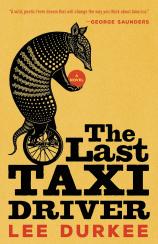The Last Taxi Driver
Review
The Last Taxi Driver
The dark despair of driving in urban circles has been well-captured on film: think Taxi Driver and Repo Man. Lee Durkee’s novel, THE LAST TAXI DRIVER, shares with the above a perspective on American life that is both realistic and paranoid and a frantic energy that emanates from its protagonist. The potential for violence lurks on every page and erupts in assaults sadly mundane and shockingly horrific. Yet the story of Lou, a taxi driver of rapidly disintegrating mental and physical health, has moments of the sublime as he chases ideas about Shakespeare, Buddhist enlightenment, and the light-filled possibility of alien abduction.
In the single day that this novel spans, Lou shuttles the elderly, the addicted, the infirm, the drunk, the strange and even the dying in a dilapidated Town Car to and from the trailer parks, seedy motels, hospitals and convenience stores of northern Mississippi. As he drives, arguing with Stella, the owner of All Saints Taxi, and Horace, the spiteful dispatcher, Lou judges the people in his car and tries to show what he believes to be fair kindnesses, contemplates his troubled past, ponders his future, takes what he hopes is an Adderall that fell on the floor of his taxi, and drinks at least five Red Bulls.
"Lou’s excruciating day will make readers cringe, and the recounting of his traumas is more than unsettling. This is a dark, feverish and weird tale that remains compelling throughout."
Lou’s passengers are diverse but united in their desperation: an old woman going for dialysis, a rich alcoholic who urinates in the car but tips $100, a wife hiding from her husband being aided by her mother-in-law, a man just released from prison with nowhere to go. Readers, like Lou, only get glimpses of most of these people, though their presence lingers --- in the taxi and in the story. The center, of course, is Lou himself. Steering the taxi through a hectic and dangerous day, his delirium and anxiety increase as he is overcome with memories, regrets, rage and exhaustion.
Lou beholds his fares at what he believes to be a distance. But their terrible habits, sorrows and loneliness, cruelties and frailties are his as well. Even as he is an eyewitness to their crimes and mistakes, worth and humanity, he often fails to see the same in himself. In Lou, Durkee has created a fascinatingly complex character.
THE LAST TAXI DRIVER is not a long novel and speeds along at a brisk pace. Each chapter is almost a distinct vignette, some better than others, but the book is cohesive and tied together well. Readers will easily find many metaphoric interpretations in the physicality of Lou’s driving, but Durkee is not really heavy-handed with them. There is humor here --- from Lou’s driving advice, to his appreciation of the late comedian Bill Hicks, to his searing observations of self and passenger --- but the novel is also deadly serious. Durkee tackles race and poverty, violence of many varieties, loss and longing, and the power of the imagination.
Lou’s excruciating day will make readers cringe, and the recounting of his traumas is more than unsettling. This is a dark, feverish and weird tale that remains compelling throughout.
Reviewed by Sarah Rachel Egelman on March 6, 2020




